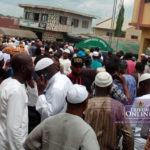IN the name of Allah, the Beneficent, the Merciful.
The administration of public affairs is governed by basic principles to achieve the desired objectives, peace and tranquility in a society. The various systems of government around the world, including democratic representatives, authoritarian, totalitarian, tyrannical, military, monarchical, aristocratic or fascistic through one-party system, have failed the peoples of the world.
Even the American democracy of two-and half centuries was recently threatened with the orchestrated invasion of the Congress by desperate Republicans and white supremacists to circumvent the electoral mandate of the people.
Thus, the world is yearning for good governance that will be people-oriented, devoid of desperation, greed, avarice, covetousness, rapacity, cupidity, mortal sin and deadly sin.
Therefore, the underlining principles of governance in Islam presuppose that firstly, God Almighty is the sovereignty of a country, county, or community, as the Creator of the heavens and the earth (Al-Khaliq) (Qur’an 36:81; 39:62; 40:62; 43:86). God Almighty is the one that brings everything from non-existence to existence.
The Holy Quran, Az-Zumar 39:62-63, testifies: “God is the Creator of all things, and He is the Guardian and Disposer of all affairs. To Him belong the keys of the heavens and the earth. And those who reject the signs of God, it is they who will be in loss.” Also, the Holy Qur’an, Yasin 36:81-83 agrees, “Is it not He Who created the heavens and the earth able to create the like thereof?” Yea, indeed! For He is the Creator Supreme, of skill and knowledge (infinite)! Verily, when He intends a thing, His command is, ‘Be’, and it is! So, glory to Him in Whose hands is the dominion of all things. And to Him will ye be all brought back
Secondly, God Almighty is the director of all affairs and Disposer of all affairs (Al-Wakeel) in a state (Qur’an 4:132; 13:28; 73:9). The leadership of a state must direct affairs with the fear of God. The Holy Qur’an, An-Nisa 4:132, says, “Yea unto God belong all things in the heavens and on earth and enough is God to carry through all affairs.” This is acting as the vicegerent of God in an appointed or elected position, and shall account for the deeds before God on the Day of Resurrection (Qur’an 2:30-34; 6:44,165). This demonstrates that the leadership must be seen as a trust, as they will be held accountable for their actions in the governance of public affairs, both in this life and hereafter.
Third is the principle of equality of all before the law in a state, including the leadership appointed over a period of time (Qur’an 49:13). The Holy Qur’an, An-Nisa’, 4:135, says, “O ye who believe! Stand out firmly for justice as witnesses to God even as against yourselves or your parents or your kin and whether it be (against) rich or poor for God can best protect both. Follow not the lusts (of your hearts) lest ye swerve and if ye distort (justice) or decline to do justice. Verily God is well-acquainted with all that ye do.” The Holy Prophet Muhammad (SAW) emphasised this in his Farewell Sermon delivered on the ninth day of Dhul-Hijjah, 10 A.H. ( 623AD) in the Uranah valley of Mount Arafat in Mecca. “…You know that every Muslim is the brother of another Muslim. All mankind is from Adam and Eve. An Arab has no superiority over a non-Arab, nor a non-Arab has any superiority over an Arab. Also, a white has no superiority over a black nor a black has any superiority over a white – except by piety and good action. Learn that every Muslim is a brother to every Muslim and that the Muslims constitute one brotherhood. Nothing shall be legitimate to a Muslim that belongs to a fellow Muslim unless it was given freely and willingly. Do not therefore do injustice to yourselves. Remember, one day, you will meet Allah and answer your deeds. So, beware: do not stray from the path of righteousness after I am gone.”
Fourthly, the principle of mutual and popular consultation (shura) is crucial in political Islam, as people’s will, interest, need, and want must prevail at all times. The Holy Qur’an, Ash-Shura, 42:38, says: “Those who hearken to their Lord and establish regular prayer; who (conduct) their affairs by mutual consultation; who spend out of what We bestow on them for sustenance.” A Hadith of the Holy Prophet Muhammad (SAW) says, “It has been narrated on the authority of Abu Huraira that the Prophet of Allah (may peace be upon him) said, ‘A commander (of the Muslims) is a shield for them. They fight behind him and they are protected by (him from tyrants and aggressors). If he enjoins fear of God, the Exalted and Glorious, and dispenses justice, there will be a (great) reward for him; and if he enjoins otherwise, it redounds on him’” (Sahih Muslim, Book 20, No. 4542). The Holy Qur’an, Al-Imran, 3:159 emphasises mutual consultation: “It is part of the Mercy of God that thou dost deal gently with them. Wert thou severe or harsh-hearted they would have broken away from about thee; so pass over (their faults) and ask for (God’s) forgiveness for them; and consult them in affairs (of moment). Then when thou hast taken a decision put thy trust in God. For God loves those who put their trust (in Him).”
Fifthly is the adoption of majority decisions by all participants in political processes. This is also called consensus of scholars (Ijma). This universal and infallible agreement of either the Muslim community as a whole or Muslim scholars in particular is important as a principle in political Islam. The three classifications of consensus (Ijma) are one, Ijma of Companions. The concurrent opinion of the companions of Prophet was considered most authoritative and could not be overruled or modified; two, Ijma of the jurists. This was the unanimous decision of the jurists (other than the Companions); and three, Ijma of majority decisions or votes of the people.
Sixth, the equitable dispensation of justice (‘Adl) to all and the enforcement of the rule of law is essential in the principles of public affairs in Islam (Qur’an 4:65, 105, 135; 7:29; 16:90; 57:25). The Holy Qur’an, An-Nisa, 4:58 says, “Allah doth command you to render back your trusts to those to whom they are due; and when ye judge between man and man that ye judge with justice: verily how excellent is the teaching which He giveth you! For God is He who heareth and seeth all things”.
Seventh, the obedience of the people to the constituted authority that abides by the dictates of God, and opposition to the dictates of the authority to those things that God forbids (Qur’an 3:104, 110). The Holy Qur’an, An-Nisa, 4:59 says, “O ye who believe! Obey God and obey the Apostle and those charged with authority among you. If ye differ in anything among yourselves refer it to God and His Apostle if ye do believe in God and the Last Day. That is best and most suitable for final determination.”
The Hadith of Prophet Muhammad (SAW) says it has been narrated on the authority of Ibn Juraij that the Qur’anic injunction, ‘0 you who believe| Obey Allah, His Apostle and those in authority from amongst you’ (iv. 59) was revealed in respect of ‘Abdullah b. Hudhafa b. Qais b. Adi al-Sahmi who was dispatched by the Holy Prophet (may peace be upon him) as leader of a military campaign. The narrator said: ‘He was informed of this fact by Ya’la b. Muslim who was informed by Sa’id b. Jubair who in turn was informed by Ibn Abbas’ (Sahih Muslim, Book 20, No. 4517).
Also, it has been narrated on the authority of Abu Huraira that the Holy prophet (may peace be upon him) said, “Whoso obeys me obeys God, and whoso disobeys me disobeys God. Whoso obeys the commander (appointed by me) obeys me, and whoso disobeys the commander disobeys me” (Book 20, No. 4518).
May Almighty Allah guide us aright in accepting the Islamic principles of public affairs so as to have peace and tranquility in governance globally. Amen.
YOU SHOULD NOT MISS THESE HEADLINES FROM NIGERIAN TRIBUNE
We Have Not Had Water Supply In Months ― Abeokuta Residents
In spite of the huge investment in the water sector by the government and international organisations, water scarcity has grown to become a perennial nightmare for residents of Abeokuta, the Ogun State capital. This report x-rays the lives and experiences of residents in getting clean, potable and affordable water amidst the surge of COVID-19 cases in the state…Islam and public affairs Islam and public affairs
Selfies, video calls and Chinese documentaries: The things you’ll meet onboard Lagos-Ibadan train
The Lagos-Ibadan railway was inaugurated recently for a full paid operation by the Nigerian Railway Corporation after about a year of free test-run. Our reporter joined the train to and fro Lagos from Ibadan and tells his experience in this report…Islam and public affairs Islam and public affairs






